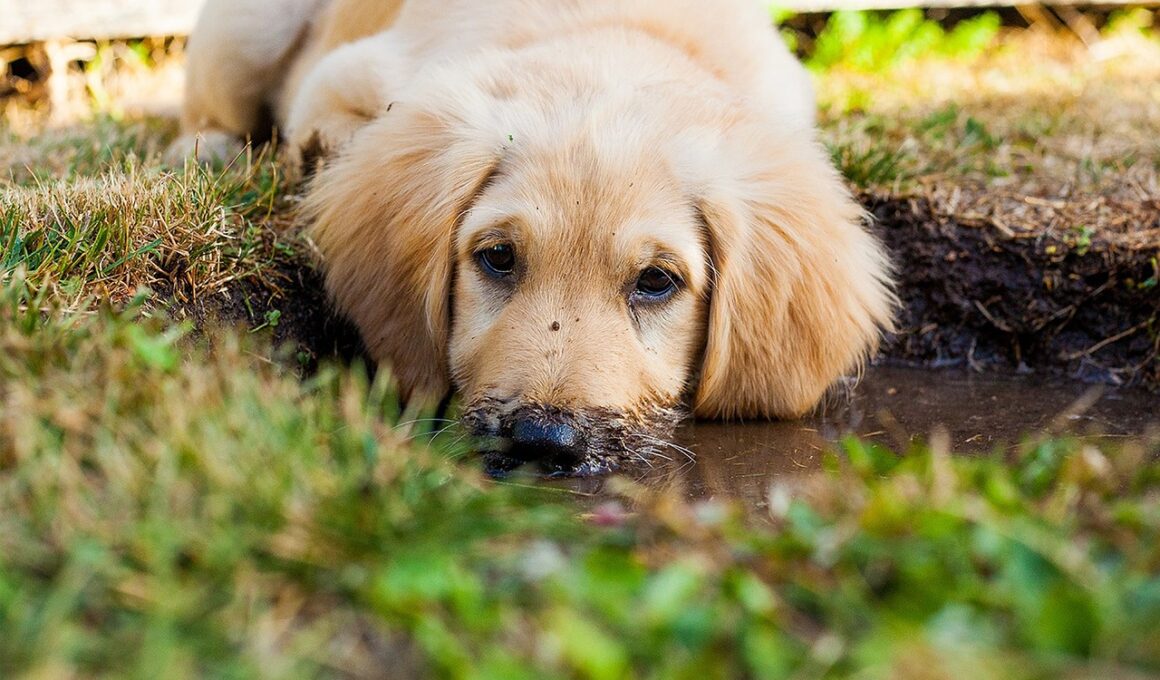The Role of Exercise in Reducing Dog Digging Behavior
Dog digging behavior can be distressing and often confounding for many pet owners. It’s not uncommon for dogs to dig in gardens or yards, leading to frustration and damage. Understanding the reasons behind this behavior is crucial. Many dogs dig out of boredom, stress, or excess energy. Inadequate physical exercise and mental stimulation are often significant contributors. Providing ample exercise ensures that dogs engage their physical bodies and minds. Additionally, an overstimulated dog may dig as a means to release pent-up energy. Regular walks, playtime, and interactive games can help alleviate these tendencies. Moreover, dogs instinctively dig to create comfortable sleeping areas or to explore their environment. Owners should also consider whether their dog has access to appropriate digging outlets, such as sandy areas. Remember, a well-exercised dog is typically more content. Understanding the interplay between exercise and behavior is key to curbing unwanted habits. Identifying the root causes of digging enables owners to implement effective strategies that encourage healthy habits for both themselves and their pets.
One effective approach to manage dog digging behavior involves establishing a consistent exercise routine. A dog’s energy levels can vary significantly, affecting its behavior. Engaging in daily physical activities can manifest improvements in your dog’s behavior. Different breeds have varying exercise requirements, which should be considered when creating an exercise plan. For example, high-energy breeds like Border Collies often require more vigorous forms of exercise, including jogging or agility training. On the other hand, smaller breeds may need less intense activities, such as leisurely walks or gentle play sessions. Varying the types of exercises can be beneficial by keeping things fresh and exciting for your dog. Incorporating interactive toys and puzzles can also stimulate your dog’s mind while enhancing physical activity. Dogs need mental engagement just as much as physical outlets. Throughout exercise sessions, be on the lookout for signs of exhaustion. Over-exercising can lead to injuries or fatigue, which is counterproductive. Always tailor your exercise routines to suit your dog’s particular needs for optimal results.
Creating an Enrichment Environment
In addition to regular exercise, creating an enriched environment can positively influence your dog’s digging behavior. Providing an engaging home environment allows dogs to engage their natural instincts while preventing undesirable habits. Consider introducing a variety of dog toys specifically designed for chewing or digging. Items that promote digging, such as designated digging boxes filled with safe materials, encourage this behavior in a controlled manner. These boxes can include dirt, sand, or even shredded cardboard, allowing dogs to engage in digging without damaging other areas. Furthermore, maintaining an environment rich in sensory experiences can also aid in curbing boring behaviors. Introduce new scents, sounds, textures, and toys that keep your dog’s mind engaged which prevents seeking entertainment by digging. Consistently rotating toys and activity options can vastly improve stimulation. Engaging in activities together that mimic hunting or exploration can satisfy their need for searching behaviors. Take the time to interact with your dog and teach them appropriate outlets for their energy to foster a happier, more balanced pet.
Additionally, socialization and playdates can significantly contribute to reducing digging behaviors in dogs. Dogs are social animals that thrive on interaction and companionship. Engaging your dog with other friendly dogs can expel excess energy while cultivating social skills. Establishing playdates at a local dog park or inviting another pet-friendly dog over can provide valuable opportunities for exercise and play. Interactions with other dogs often involve running, wrestling, and chasing, which delivers ample physical activity and mental stimulation. When dogs are actively engaged with other dogs, they may not seek out alternative forms of entertainment, such as digging. Keep in mind, however, that supervision is crucial during playtime. Ensure that your pet and their playmates play safely without becoming overwhelmed or aggressive. Positive experiences with other dogs can foster long-term friendships. Additionally, observing social dynamics can yield insights into your dog’s behavior, helping you adjust training approaches as needed. Maintaining a good balance of socialization is an essential aspect of overall dog wellbeing.
Training and Behavioral Cues
Training your dog to understand acceptable behaviors can significantly reduce digging tendencies. Reinforcing commands and behavioral cues creates a channel for better communication between you and your dog. Positive reinforcement training is an effective method where good behavior gets rewarded consistently. Consider commands like “leave it” or “stay,” which help redirect attention from digging to more appropriate actions. Proper training techniques also involve redirecting your dog when digging occurs. When you catch your dog in the act, calmly redirect them to an appropriate behavior, like playing fetch or going for a walk. It’s crucial not to scold the dog harshly as negative reinforcement can lead to anxiety or fear, which could exacerbate digging tendencies. Patience and consistency are vital for effective training. Utilizing treats and praise encourages learning and fosters trust between you and your dog. The bond formed during training sessions is invaluable in addressing behavior issues while fostering a positive relationship. Engage in regular training sessions, which will not only improve digging habits but also enhance overall obedience.
Understanding the underlying motivations for digging behavior is essential in addressing this challenge effectively. Dogs may dig due to instincts ingrained in them from their ancestors, driven by purposes like finding shelter or hunting prey. Recognizing that some digging behavior may be stress or anxiety-driven is crucial. If your dog exhibits signs of anxiety or restlessness, it’s advisable to consult with a veterinarian or canine behaviorist. They can help evaluate if there are underlying health issues or behavior disorders at play. Often, addressing the root causes of anxiety through exercise, training, and therapeutic practices can lead to positive results. Calm, controlled environments paired with healthier outlets for energy will yield improvements. Another helpful strategy involves using calming techniques, such as providing a cozy den or retreat area for your dog. These spaces can offer comfort during stressful situations. Building confidence through socialization and positive interactions also fosters emotional health. By understanding motivation behind digging, you can equip yourself with the tools necessary to manage your dog’s behavior more effectively.
Conclusion: The Journey to a Balanced Pet
Ultimately, addressing dog digging behavior requires a comprehensive approach. Guaranteeing your dog receives ample exercise, engaging activities, and appropriate training will foster a healthy lifestyle. Socialization, mental stimulation, and creating an enriched home environment significantly contribute to reducing undesirable behaviors. Remember that every dog is unique, and finding the right balance may take time and experimentation. It’s essential for pet owners to be patient and adaptable to the specific needs of their dogs. Always be observant and attentive to what your dog enjoys most, then integrate those activities into their routine. Regular vet check-ups can also ensure that you’re providing the best care for your furry friend. The goal is to create an environment where your dog feels secure, balanced, and content. As a result, the chances of engaging in unwanted digging behavior will diminish. Remember, every dog can learn and adapt with the right motivation and encouragement, leading to a mutually rewarding relationship with their owners. Your dedication to improving your dog’s lifestyle will yield long-term benefits for both you and your beloved pet.


